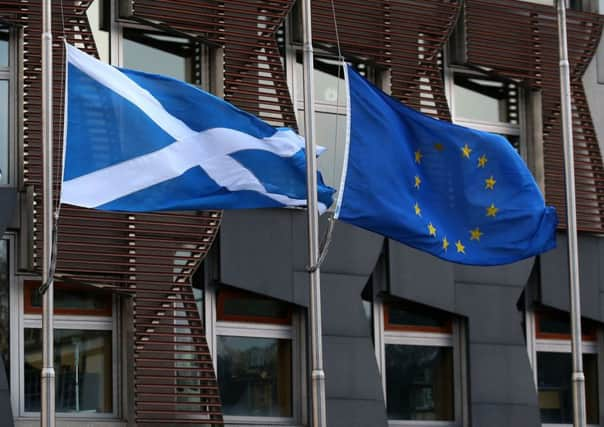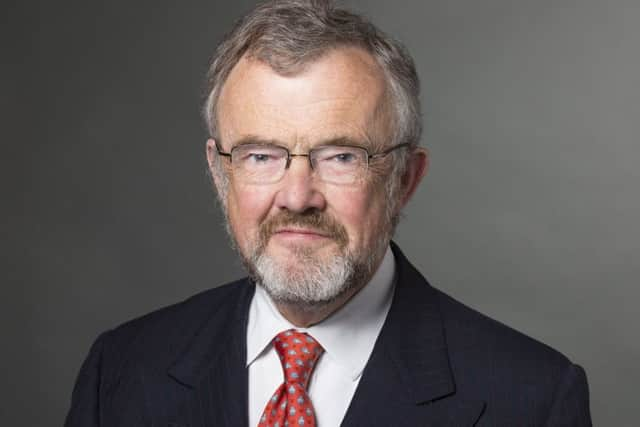Ian S Forrester and Sir David Edwards: Brexit will throw Scots law into shadow


The Colloquium will be held in the Scottish Parliament with a reception in Edinburgh Castle hosted by the Cabinet Secretary, Fiona Hyslop. The speakers will include judges and former judges of the Court of Session, UK Supreme Court, the French Conseil d’ État, EFTA and EU courts, academics, and practitioners faced with the daunting probability of coping with a Brexit whose terms are still undefined.
In the referendum, a British majority voted No while a Scottish majority voted Yes. Regardless of the political merits of the concept of Brexit, there are many practical difficulties and choices. We look forward to an intelligent discussion of them.
Advertisement
Hide AdAdvertisement
Hide AdFor 44 years our country has governed its affairs collectively with the other European Member States in a vast range of fields of activity. Regardless of whether cooperative rule-making was politically good or bad in terms of sovereignty, leaving the EU will not be like resigning from a golf club. Our highly regulated society is not going to be deregulated due to Brexit. There are dozens, if not hundreds, of important questions which need to be addressed calmly and realistically. Some are:


l A murder is committed in Glasgow. The suspect flees to another EU Member State. Under the current European Arrest Warrant they can be arrested, detained and extradited to stand trial in Scotland. What will be the future regime?
l What is to be the future of cross-border family law, which depends on judicial cooperation defined in EU rules?
l Japanese industrialists have said the UK will be a less attractive place in which to invest if the UK is outside the Customs Union. How do we persuade them to invest here?
l The Scottish population is declining. We need immigration from outside Scotland to maintain our tax base to pay for pensions and other social benefits. Scottish farmers and hoteliers need seasonal workers. And the NHS needs more doctors, nurses and others. How can we attract new citizens from outside Scotland and keep them here?
l Many areas of Scottish daily life (pharmaceuticals, equal pay, air transport, environment, animal feed, etc) are governed by European rules. The market-place is frequently European rather than national and UK manufacturers will prefer a single standard. What rules are to apply after Brexit? If the goal is to maintain common rules (with the possibility of diverging) for the UK and EU27, who will decide them for the UK? How many UK specialised agencies will be established to take the place of EU agencies dealing with food standards, vehicles, data security, medicines or trademarks?
EU law will continue to apply undiluted in the UK after Brexit during the transitional period, and subsequently in some sectors. How are Scottish courts to approach questions of interpretation and what status should be accorded to the decisions of the Court of Justice of the European Union?
An EU regime protects denominations of origin, such as Chianti, Camembert, Feta, and Parma ham and rejects California Chablis or Wisconsin Brie. Scotch whisky, Arbroath Smokies, Stornoway Black Pudding and others have been recognised and protected by EU law in the 28 EU countries, as well by international treaties to which the EU is party around the world. Scots law does not give this protection. How are these guarantees of genuineness to be maintained after Brexit?
Advertisement
Hide AdAdvertisement
Hide AdFour to five million people living outside the country of their nationality are directly affected.
Young people have grown up regarding it as unremarkable to be able to regard Seville and Liège and Berlin as no less accessible than Inverness or Exeter as places to study, seek a job, open a business, earn money, get medical care, buy property or, in due course, to retire.
Tens of thousands of Eastern Europeans work in Britain. London has more French citizens than Lille. What is the future for them? Must a Scot working in Berlin become German in order to be sure to remain there?
The Colloquium will be an opportunity for UK and French lawyers to review the problems presented for each of them.
To what extent can the mutual advantages of common standards be maintained? French and UK lawyers confront ultimately the same existential uncertainties and have the same interest in cooperating to cope with them.
When cross-border links are unfortunately regarded with hesitation and scepticism, this event offers an admirable forum for better understanding.
Sir David Edward is a former Judge of the European Court of Justice. Judge Ian S Forrester is President of the Franco-British Lawyers Society